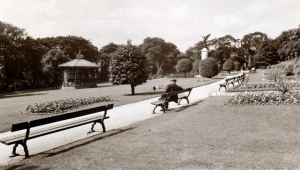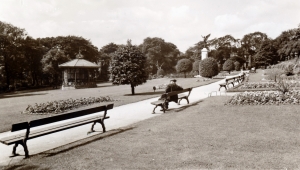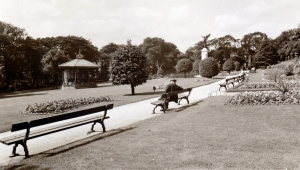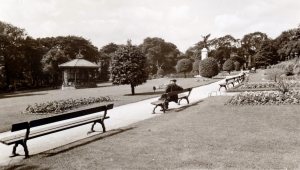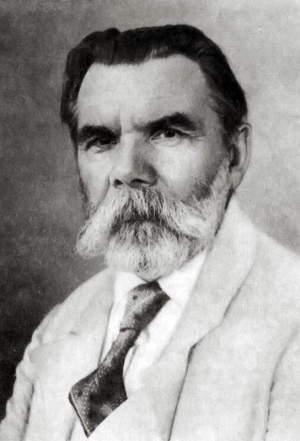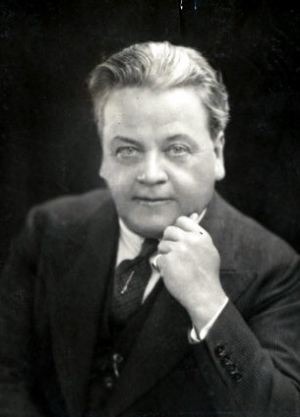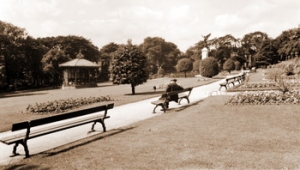
Chris Helme
I spotted this a few days ago - the demolition men were demolishing the old Co-op Petrol Station kiosk on Lawson Road. I am sure many readers will remember calling in. I wonder if any of the staff that used to work in it are still around ? - It would be great to try and locate a photograph showing the inside of the kiosk, possibly with members of the staff on it as well..
Born: March 4, 1877 (or February 20, 1877) - Moscow, Russia
Died: July 9, 1957 - Moscow, Russia
Alexander Fyodorovich Goedike grew up in a musicians' family of German origin. His grandfather Karl was an organist and singing teacher. His father, Friedrich Alexander Paul was also organist and pianist in the Bolshoi Theater in Moscow. Another Karl, perhaps a brother of his father's, is said to have been a trumpeter in the Bolshoi Theater Orchestra. He is said to have performed Tchaikovsky's "Neapolitan Dance" in 1876 in public, one year before the world premiere of the ballet Swan Lake in which this famous cornet solo is to be found.
However this may be, Alexander Fyodorovich Goedike studied the piano at the Moscow Conservatory and in 1900, in Vienna, won the Rubinstein Composition Prize for his Concert Piece for piano, Op. 2/2 (1896). In 1909 he became professor of piano at the Moscow Conservatory, and in 1919 for organ and chamber music.
His training as a composer, on the other hand, was informal. As a highly respected organist and teacher, Goedike represented the classical direction, oriented on the German model, and influenced an entire generation of organists in the Soviet Union. Besides numerous organ works, Goedike composed four operas, three symphonies, various overtures, vocal works, and chamber music. In addition, he wrote one concerto each for piano (Op. 11, 1900), organ (Op. 35, 1927), horn (Op. 40, 1929), trumpet (Op. 41, 1930), and violin (Op. 91, 1951).
He also wrote the Concert Etude which we are featuring on this show which has been arranged by William Broughton and performed by solo trombonist Brett Baker.
Haydn Wood was born in the West Riding of Yorkshire town of Slaithwaite on 25 March 1882. When he was three years old his family moved to the Isle of Man, an island which was often a source of inspiration for the composer. In 1897, at the Royal College of Music, he studied violin with Enrique Fernández Arbós and composition with Charles Villiers Stanford. In 1901, he was soloist at a special concert commemorating the opening of the Royal College of Music’s Concert Hall.
The concert was attended by Joseph Joachim (who had heard him play before) and Pablo de Sarasate. They were so impressed that they sent him to Brussels for study with the renowned teacher César Thomson. He then embarked on a world tour, accompanying the Canadian soprano Dame Emma Albani and they continued their association for a further eight years. From 1913 to 1926, he toured extensively with the soprano Dorothy Court whom he married in 1909.
He also gained considerable success from his works, particularly his songs. From 1939, he served as a director of the Performing Right Society. On the occasion of his 70th birthday Haydn Wood was given a full concert dedicated to his music by the BBC. He died in a London nursing home on 11 March 1959, two weeks before his 77th birthday.
Haydn Wood was a prolific composer of orchestral music, including 15 suites, 9 rhapsodies, 8 overtures, 3 concertante pieces and nearly 50 other assorted works, including 180 individual songs. His orchestral pieces were primarily of the “light music” style; a well known piece of his is the three-movement Fantasy-Concerto. Another is his London Landmarks Suite, particularly “Horse Guards, Whitehall”. In 1916, he composed the popular song “Roses of Picardy” for his wife. After a time writing popular music, Wood began to write musical comedy; his best-known piece of this genre is the musical play Tina. The tone poem Mannin Veen (pub. 1933, Manx for “Dear Isle of Man”) was based on four Manx folk tunes, and is one of two works written originally for wind band by Wood. The work is also occasionally performed in its orchestral version.
On this week's show we have his song 'A Brown Bird Singing', a very popular cornet and flugel horn solo.
Enjoy
Sorry this show is a repeat from April 2016 there is no new show for this week as I have been away, normal service will resume for next week...
Chris
Talks Available
All the presentations are timed to last up to an hour except where shown - questions are gladly taken after the presentation. All have been presented to male, female and mixed audiences of varying age groups.
-
A Postcard from the Past
The Sunny Vale Pleasure Gardens, Halifax - Yorkshire’s Alton Towers of the…
-
All in a Days Work
Reminiscences from 30 years in the Police Service – (humorous lecture presentation)…
-
Legends from the world of Brass Bands
(Info-tainment – digital slides & music) – 1 hour presentation.
-
A Week in May
A story based on the Murder of Lord Frederick Cavendish (of the…
- Memories of Christmas Past
-
The Road to Publication
In 1979 I was asked to assist in presenting a series of…
- Holiday Memories from the Past
-
How we used to live
We have all seen and experienced changes in our lives. Bring back…
-
Other Folks Rubbish (Not suited to a Zoom presentation)
With a local history theme… – (thought provoking humorous lecture presentation) –…
- So you want to be a Pirate ? - The life of a Pirate was not all that it seemed
- Superstitions, New Year Resolutions and the Origins of St Valentine's Day
- Brighouse at Work
-
Sorry but I am not able to accept any more face to face talk bookings at the present time ONLY ZOOM TALKS


